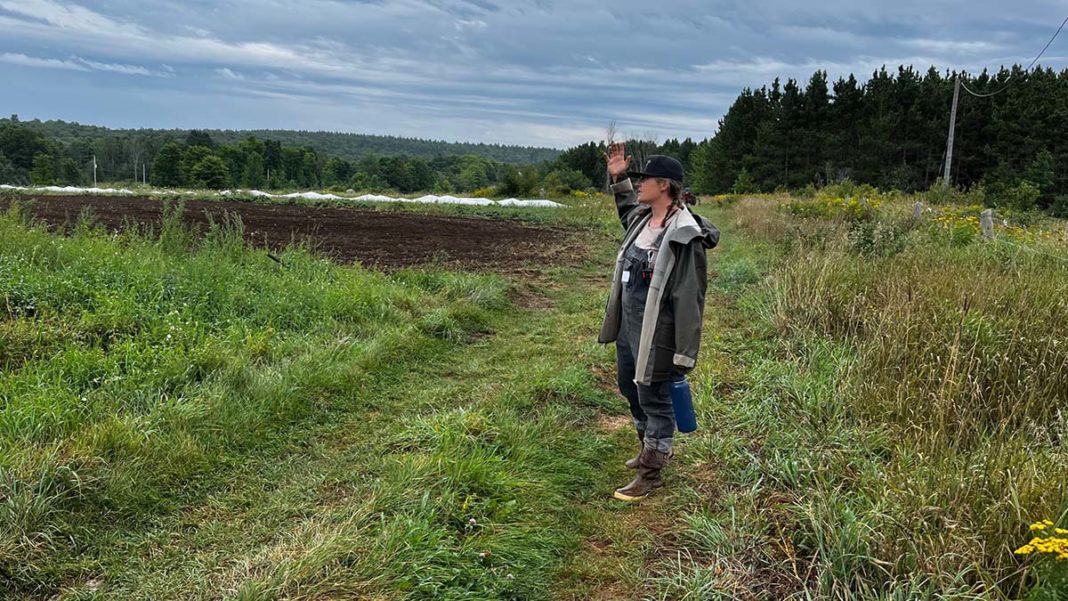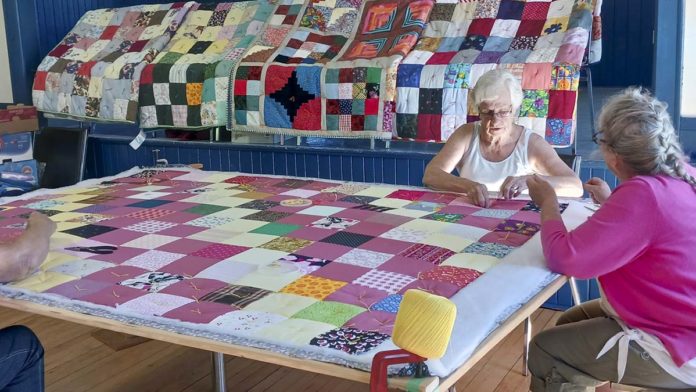ICE LAKE—An in-person field day hosted by Ecological Farmers Association of Ontario (EFAO) introduced participants to organic farming principles. Three Forks Farm owners Peggy Baillie and Eric Blondin, and Linda and Chuc Willson of Our Garden, shared how they work with the land and deal with the challenges presented by growing on Manitoulin Island.
Three Forks Farm is certified organic and produces mixed vegetables and fruit, garden seeds and chickens. The Willsons have been organically growing, harvesting, storing, preserving and marketing food for over 30 years, producing a line of natural jellies, relishes, pickles, vinegars and oil all from herbs, fruit and vegetables grown or foraged on their land. Both farms are located in Ice Lake.
While each farm is unique, they’re also not that different. Similarities are found in their key messages of diversification, organic growing methods, healthy soil, natural pest management, experimenting, collaborations, access to water, knowing your market, and maintaining biodiversity. The farmers also face similar challenges.
Maintaining a healthy work-life balance is one challenge. Ms. Baillie and Mr. Blondin address the issue by not working on evenings and Sundays, and through division of duties. Mr. Blondin looks after the market garden and Ms. Baillie takes care of seed production. Three Forks Farm also has two full-time and one part-time staff who work on farm and three part-timers that help with the markets. They try to hire people who have a genuine interest in farming.
The Willsons are trying to downsize their production to make things easier as they age, and they have a succession plan for when they’re ready to retire.
Pests and predators are a big issue everywhere on the Island. The Willsons use row covers and mulching to help with pest control. They use fencing, netting, scarecrows, noisemakers and other low-tech methods to deter larger pests that include birds, rabbits and deer.
Both farms use fencing of some sort. Three Forks has fenced 10 acres of its 100 acres with a high tensile electric perimeter wire fence for deer. “We do have extreme deer pressure here on the Island and even with the high tensile fence, we do have deer that manage to get through,” Ms. Baillie said.
In the last three years they’ve lost about $30,000 worth of crops to deer and some seed crops this year. “We’re just trying to get better and find better ways to manage,” she added.
Two livestock dogs protect the chickens from predators.
All of the brassica crops (kale, bok choy, broccoli, cabbage, etc) at Three Forks Farm are grown under insect netting for the duration of the plants’ lives because of the diamondback moth. “We use insect netting as a first level of protection because we don’t use pesticides or insecticides,” said Ms. Baillie. “Everything wants to eat brassicas.”
They also only grow cucumbers for market production in greenhouses because of cucumber beetles and hang netting at the entrances. They sometimes buy beneficial insects and will let bees in as well.
Biodiversity plays a key role in the success of both farms. Take a walk on the public trails at Ravenswing, the name the Willsons have given their farm, and you will go through healthy forests, meadows, wetlands and a restored apple and pear orchard. You’ll also find thriving hawberry and chokecherry trees.
Three Forks Farm does not look like what many people think a farm should look like: there are a lot of wild and beautiful pollinator areas. “This is important for us,” said Ms. Baillie. “It’s not a groomed and trimmed farm but this is really important to the biodiversity of the farm, improving habitat for beneficial insects and also pollinators.”
Healthy soil is crucial for farming. Three Forks uses buckwheat, peas and oats as cover crops. They suppress weeds and make other nutrients more available for the plants in the next season. “It’s better to have your soil covered in plant life for soil health rather than have it naked with nothing growing in it. Having things planted in it feed the soil’s microbiology which will in turn help feed the plants in the future. We try to have cover crops when we have time.”
The chickens Ms. Baillie and Mr. Blondin raise under the artisanal chicken program also help with soil fertility. The chickens spend much of their lives outdoors in chicken tractors that are moved weekly. “They have so much to eat out here and they love it,” Ms. Baillie said. “We’ve definitely seen a dramatic increase in fertility in the areas where the chickens have been.”
The Island is challenged soil-wise, said Ms. Willson, adding they are very fortunate to have good soil. “There’s a rich, glacial deposit of it. Glacial soil is the best soil. It’s rich in nutrients.”
The Willsons must still amend their soil. “We grow intensively on a small plot. Lettuce is our specialty crop that we sell at summer markets but it draws nitrogen from the soil. So how do we amend? We use compost.”
Both farms use locally produced Meeker’s Magic Mix. Three Forks also uses spent grain from Split Rail Brewery, applying the spent grains directly to the fields as an experiment. “We’re happy to be adding organic matter and some fertility,” said Ms. Baillie. “It’s working for us and it helps them as well.”
Lately the Willsons have been starting cover crops. There are paths full of clover, which not only adds nutrients to the soil and shades the soil, but has the added benefit of rabbits eating clover rather than the lettuce crop.
Mr. Blondin and Ms. Baillie both worked on other people’s farms before starting their own, which was helpful, as is the support that comes from organizations such as Ecological Farmers Association of Ontario (EFAO), Ms. Bailie said.
“We all eat everyday,” said EFAO’s Alison Muckle. “I think it’s really important how that food is grown. I think farming and agriculture has huge potential to maybe mitigate climate change. Agriculture has a huge effect on climate change. There’s a lot of things we can change to make agriculture more climate friendly so we can have a more sustainable future.”





